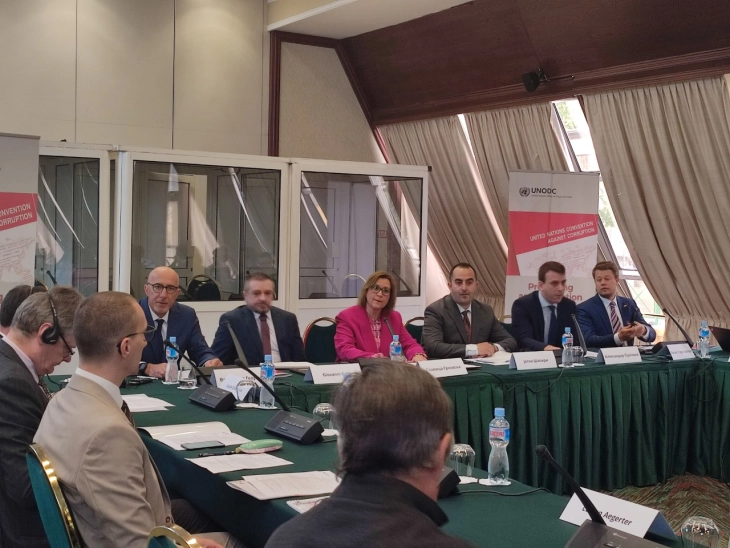Roundtable: Education is crucial element in fight against corruption, its prevention and gradual eradication
- Education for the negative effects of corruption and ways to prevent it are a crucial element in the fight against corruption, especially in its prevention and gradual eradication, said Deputy PM for good governance, Slavica Grkovska, at the opening of the “Anticorruption education – approaches and challenges” roundtable.
- Post By Nevenka Nikolik
- 15:14, 25 April, 2023

Skopje, 25 April 2023 (MIA) – Education for the negative effects of corruption and ways to prevent it are a crucial element in the fight against corruption, especially in its prevention and gradual eradication, said Deputy PM for good governance, Slavica Grkovska, at the opening of the “Anticorruption education – approaches and challenges” roundtable.
Changes begin with us, she said, when we affect our environment and then expand our influence. There are everyday practices that aren’t even perceived as corruption, which is why, Grkovska says, it’s important to have children learn how to recognize it from a young age. That is why her Cabinet started the "It’s Up to You and Me" campaign, which focuses on the youth while pointing out that everyone is part of the changes.
“It’s very important to integrate anticorruption education in school and university curriculums, but if the students don’t see these principles being applied realistically, the theoretical knowledge effect will be minuscule,” Grkovska said.
She said that corruption in the educational system sabotages positive steps forward in these commitments, listing as examples the susceptibility of teachers to pressure, unfair actions and using influence and insisting on higher grades no matter what, including sexual extortion in universities as one of the most severe forms of corruption.
“These things undermine the quality of education, and it supports the widely accepted claim that the means justify the end,” Grkovska said.
The Minister of Education and Science Jeton Shaqiri said that education is not the only segment in society that needs to work on eradicating corruption. The MES is increasing the quality of Civic Education, which entails anticorruption education that is learned in extracurricular activities.
Giovanni Gallo, Chief of the Thematic Support Section, Corruption and Economic Crime Branch at the United Nations Office on Drugs and Crime, believes that efforts and success can start, but won’t end with institutional approach.

“We need to change viewpoints, norms and behaviors. Education is the most important instrument to promote the culture of resilience to corruption in all spheres of education, to support all concepts and values of the fight against corruption and to set up integrity,” Gallo said.
Over 1000 scholars from many universities worldwide got involved in the 2021 initiative that has been combating corruption in education.
“We are ready to offer our expertise and see what tools we can use, as well as listen to your needs and achievements, to find the priorities and upgrade our ways to fight corruption,” Gallo added.
At the roundtable opening, Vladimir Georgiev, member of the Anticorruption Commission, said that education is the most specific sector when it comes to corruption, and that it will require reducing corruption in education and implementing anticorruption content in curricula in parallel.
“If we want education to be a tool against corruption, teachers themselves should be people with integrity who will be resistant to corruption,” Georgiev said.
He said that DKSK representatives are in the bilateral screenings from all chapters that need to be fulfilled on the path to EU membership, including the chapters for science and education.
“As members of the Anticorruption Commission, we take part in meetings in which the EC insists on discovering corruption risks in each chapter individually, and we discover additional risks which must be addressed in order to reduce risks in these particular chapters, including education,” Georgiev said. dk/nn/
Photo: MIA







